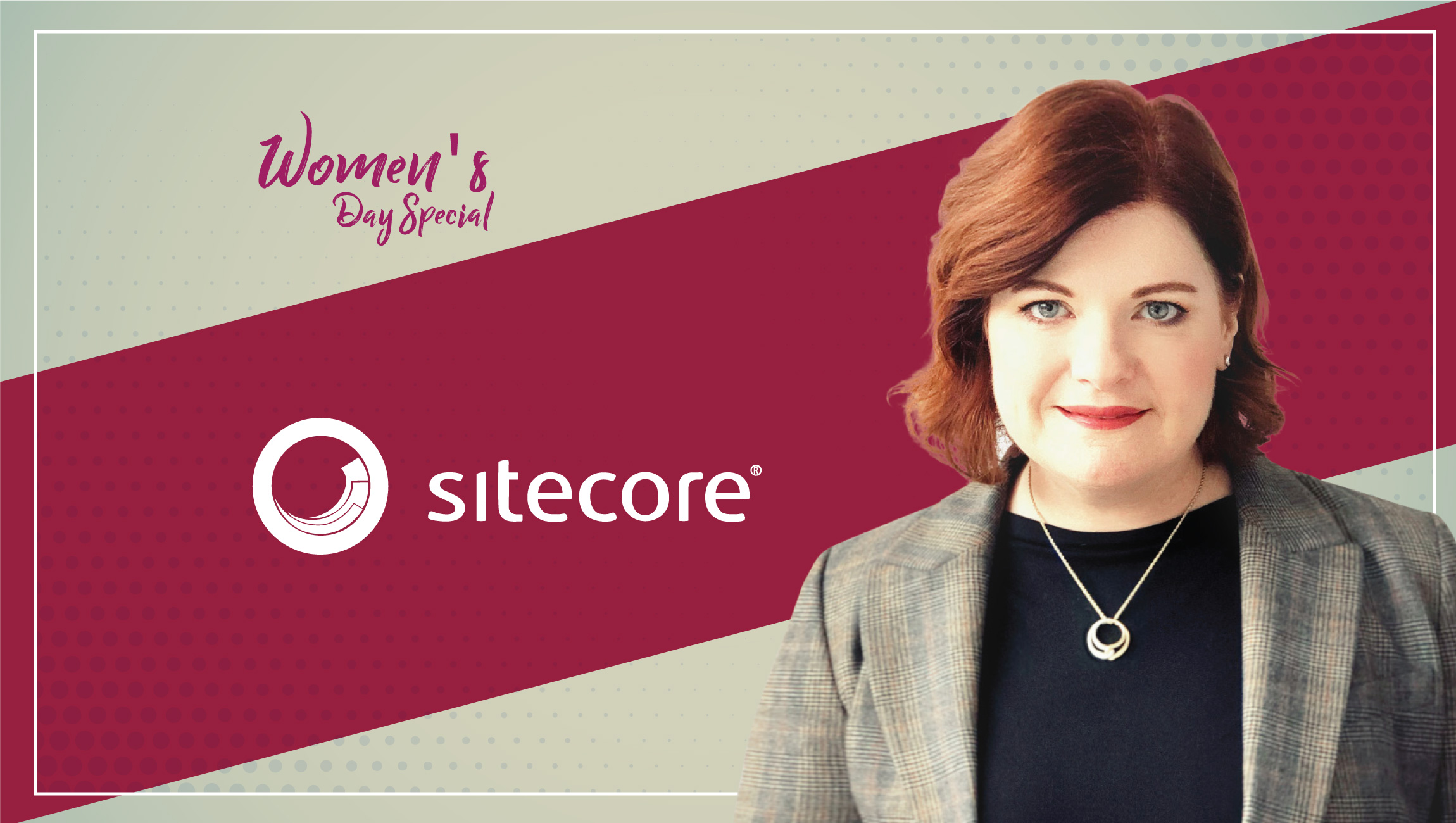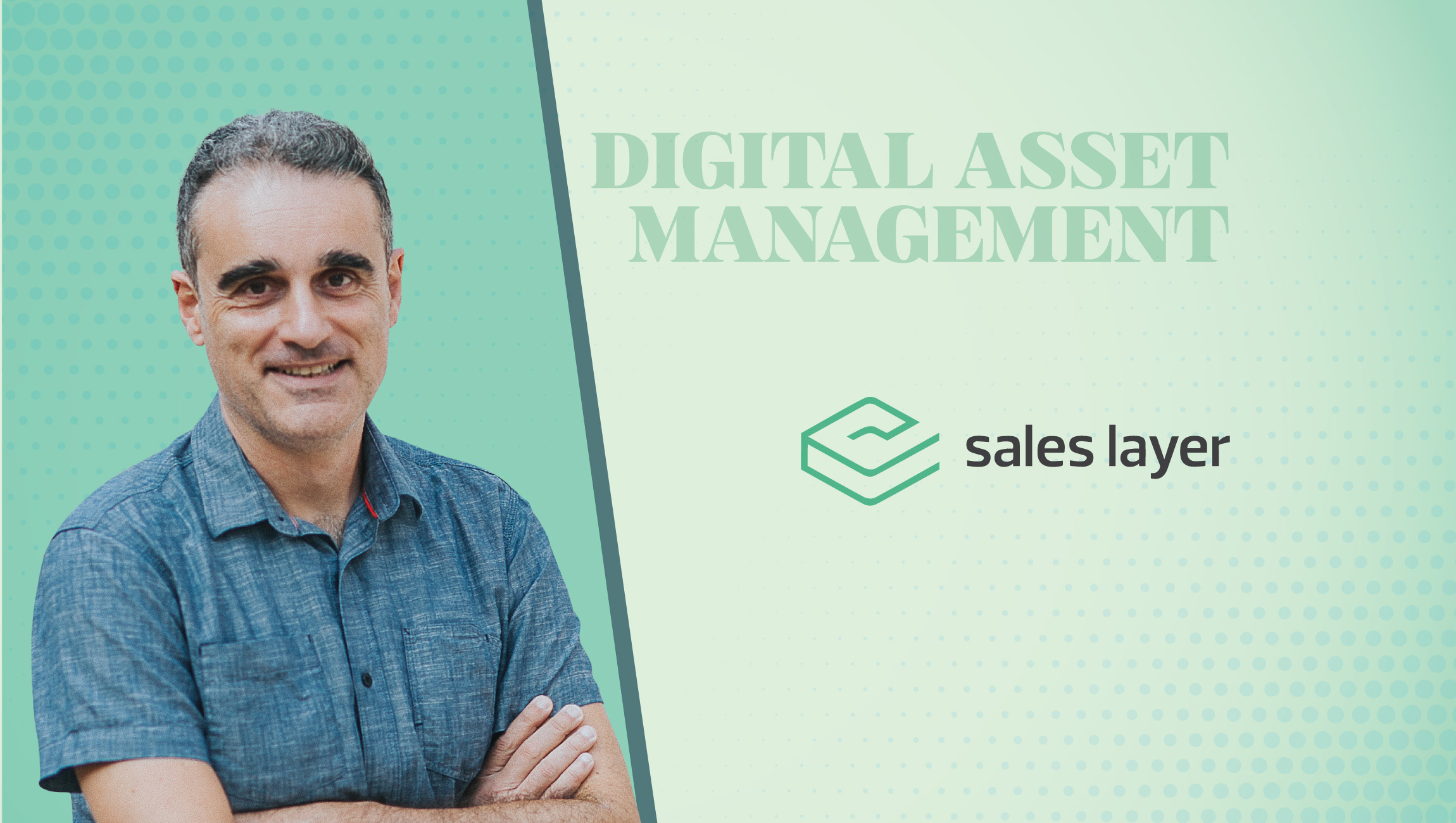[/vc_wp_text]
Tell us about your role and journey into Marketing Technology. How did you arrive at Sitecore?
I lead Sitecore‘s global marketing organization, including the company’s marketing strategy, product marketing, communications, demand generation, partner marketing, and branding. The MarTech space is my passion — I’ve been involved in the space for almost half of my career, most notably, prior to Sitecore, I was at SDL and Aprimo. During my time at Aprimo, MarTech was just starting to pick up steam and I remember marveling at the impact that it was having on the marketing department. It was revolutionary: we went from dealing with endless frustrations in measuring the impact of marketing to having so many great tools and rich data sets to help us prove the value of marketing.
As a woman in MarTech, what has been your most challenging assignment in the industry? What advice and lessons do you have for other MarTech executives?
Rising to the ranks of CMO as a woman can be a struggle. Prior to Sitecore, I was often the only woman in the C-suite and when I looked around I could not always find a female role model. Being surrounded by male leaders can make it difficult to find your own authentic voice and leadership style, versus simply emulating male counterparts. I’ve talked to many women who have found themselves adopting a more aggressive style to fit into a male-centric workplace, or who feel like they are not truly heard when they speak up to share ideas because they are not speaking the same leadership language as male peers.
Unfortunately, the underrepresentation of women in tech often fuels double standards that cause us to change our behavior in ways we would not otherwise choose. I think that is changing more now and women’s styles of leadership are hopefully being recognized and appreciated in more corporate environments. My advice would be to spend time consciously considering what you want your leadership style to be and how you’d like to be perceived — and to speak up and explicitly ask for what you want — you might be surprised at how often your request is granted!
As a Marketing Technology CMO, how would you identify the biggest advantages of leading the customer experience projects with automation and analytics?
The moment a person visits a website, they leave a trail of valuable information — their geolocation, the device type, browser, language, the channel they visit from and more — even if they didn’t leave an email address or buy a product. They leave more traces while they browse the site: what pages they looked at, content they consumed, and specific actions they triggered. The ability to collect and analyze all of this information — and also layer on third-party data based on location, such as stores near you that have the product you are looking for currently in stock — is the key to delivering a truly unique, tailored digital experience to your customers that responds to their specific interests, needs, and real-time circumstances. Based on analysis, marketers can automate both the frequency and context of interactions over any channel.
What valuable lessons did you learn from 2018’s massive mergers and acquisitions in the eE-commerce Analytics industry?
For as long as I’ve been in tech (25 years!), there has been consolidation underway in one space or another, and the MarTech space has been active for quite a few years with more certainly to come. Marketing Technology is extremely fragmented and complicated — with so many moving parts. Marketers are struggling to keep up and often have to cobble together systems to try to ease the burden.
So, I think there is a huge appetite for vendors that can simplify the equation — those could be new disruptive companies who find a better way to approach a common marketing challenge, or more established players looking to round out their offerings. I think the lesson is that after several years of becoming more and more complex, now marketing has to simplify and we will continue to find new ways to leverage technology to make that happen.
What is your vision for Mobile Marketing and how do you see Sitecore filling the gaps in demand-supply for better customer engagement platforms?
I think we are at the point where saying “mobile” is like saying “.com”. We don’t say “.com” anymore because everything is on the Internet. Similarly, customers are now flowing seamlessly between channels and expect their interactions with brands to flow seamlessly as well. If I’m browsing something on my phone while I commute, I then expect to pick up exactly where I left off when I get home and connect via my Mac.
Customer experience has evolved in a very short time from a “nice to have” to a “must have” for businesses to be successful and customer expectations are increasing by the day. Sitecore is at the center of the customer experience because we are able to collect data from every interaction point that a customer has with a brand — whether that’s online via PC, mobile, IoT, and even if that visitor is still anonymous — we can then stitch all the data together to help ensure that the seamless, individualized experience customers are expecting happens in real time.
Tell us how your previous CMO roles have helped you manage the Marketing team at Sitecore.
I’ve been a CMO for almost 15 years — from early-stage startups to public companies such as SDL and sizes in between. I’m fortunate to now have a very broad base of experience to draw on at Sitecore. I’ve learned that companies have very different marketing needs depending on their size, the maturity of their markets and many other factors. Leadership needs also vary depending on the culture and strategy of the company.
Sitecore, which is in mission-critical, high-growth markets, is growing quickly and has bold aspirations for our business and brand. So, being able to draw on all my previous experiences enables me to understand how to scale marketing to a more mature level, build a global brand for Sitecore and expand our messaging to appeal to a broader audience.
Tell us more about your product roadmap for 2019-2020.
There is a lot happening! One roadmap focus area that I’m particularly excited about maps directly to the simplicity that marketers are looking for that I mentioned earlier. To that end, Sitecore recently acquired Stylelabs, a Content Hub leader, with technology that integrates Digital Asset Management (DAM), Marketing Resource Management (MRM), and Product Information Management (PIM) into a single platform. These technologies are all about helping marketers streamline their creation, storage and usage of content.
I believe that we are facing a true content crisis in marketing today because most marketing departments can’t hire enough resources to produce the tremendous volume of content needed to fulfill the requirements of personalized customer experiences. Sitecore wants to help solve this problem for marketers, and we are working to fully integrate the powerful content capabilities we’ve acquired from Stylelabs into Sitecore’s industry-leading web content management, commerce, and digital experience solutions to create a unified platform that will help marketers easily define, create, manage, and deliver personalized content across any channel, at every stage of the customer journey. This will make a marketer’s job much easier and help solve some of the content challenges we have today.
Tell us about your go-to strategies to support rapid growth and the lessons learned through periods of massive shift and transition.
I’ve found that when companies are growing quickly — like Sitecore is at present — everyone has so many balls in the air, hiring can’t happen quickly enough, and you have many new people coming into the business who are supercharged to start making an impact but need to come up to speed quickly. It’s critical to make sure everyone is moving in the same direction, is aligned to a well-communicated set of business objectives and understands the order for priorities.
I’ve seen companies struggle by trying to take on too many initiatives — if everything is urgent then nothing is. I’ve also seen misalignment from leadership impact an organization’s ability to execute. At Sitecore, we’ve invested in a 5-year strategic plan with clearly defined focus areas and KPIs behind each one. Our goals are clear, which makes it easy to prioritize.
How do you mentor your teams at Sitecore?
I like to understand what people want in order to advance their careers so, I ask and then try to put programs in place that meet those desires. I also believe the best form of leadership is one that celebrates failures as well as successes. I’ve learned so much more from my failures over the years, and I encourage my teams to take chances and part of that is understanding that things won’t always go according to plan but that’s ok. Holding ourselves to a standard of perfection will only hinder our ability to be creative and progressive.
What does your technology community look like? Who do you meet at events and conferences to discuss technology?
Getting into the minds of senior marketers is one of my favorite past times! I do my best to seek out the individuals who are customer-experience minded and finding out what excites them in their digital transformation, what challenges they are facing, etc. I also enjoy talking to my peers, getting acquainted with other female CMOs and marketing executives in our sector.
Which Marketing and Sales Automation tools and technologies do you currently use?
Of course, we use the Sitecore Digital Experience Platform and we’ve also just rolled out our newly acquired technology from Stylelabs to help us create and manage all of our digital assets. We also use Salesforce.
What are your predictions on the most impactful disruptions in Marketing and Sales Technology for 2019-2020?
- Marketers will make meaningful progress on personalization to deliver digital interactions that are tailored to the customer’s needs and provide content that is received as a value-add. Research shows that a large percentage of marketers still need to make more progress towards authentic personalization. 2019 will usher in technology adoption in Machine Learning and data analytics, which, in turn, will enable content strategies that demonstrate the appreciation and understanding of the customer to ultimately drive stronger brand relationships.
- Experience Commerce, where brands create meaningful experiences for customers as they buy products, will go mainstream. Sitecore has been talking about Experience Commerce for some time, but in 2019 marketers and merchandisers will think of e-commerce not as a transactional episode, but as an important source of intelligence on customers’ wants, needs, and requirements. Infusing this information throughout the customer’s journey will, in turn, reduce the friction that they experience in deciding on the right product and bring them to the point of purchase, as well as give companies the intelligence to help ensure the customer is a happy user of the product or service — all of which will be driven by the delivery of personalized content.
What startups in the technology industry are you watching keenly right now?
There is a whole new generation of startups that are poised to deliver on the promise behind data-fueled AI in a big way, such as People.AI. I had the opportunity to meet their leadership team a few months ago and I was blown away by their ability to connect the dots across many disparate enterprise data sets to enhance sales and marketing performance, and uncover untapped revenue opportunities.
How do you prepare for an AI-centric world as a marketing leader?
We advise our customers on AI on a regular basis — it’s a key part of the Sitecore technology stack. And the number one thing companies need to be thinking about before they can successfully leverage AI is getting their data in order. You can’t power AI from a faulty data foundation. This is not a trivial problem!
How do you inspire your people to work with technology?
Since we are a technology company, I don’t find that my teams need inspiration to work with technology — they are already inspired and constantly bringing new ideas of technologies we should adopt. One focus that we have had lately is looking for the best tools to foster collaboration and thoughtful communication. The most impactful types of technology allow our team to build a shared vision for the department, turn presentations into interactive fishbowl discussions, and generally open the floor to shared discussions.
One word that best describes how you work.
Passionately!
What apps/software/tools can’t you live without?
LinkedIn – but for “audience engagement” — I find that it has evolved to be a fantastic tool for employee, partner and customer engagement. It’s a primary communications vehicle for me and the platform where I feel I have the biggest reach as a leader.
What’s your smartest work-related shortcut or productivity hack?
Hire the smartest, most talented people possible and let them do what they do!
What are you currently reading?
Even though I consider myself to be an early adopter of tech, I’m old school when it comes to reading. I will read articles online, but strongly prefer to hold a book in my hands. Right now I’m reading Amy Cuddy’s book “Presence,” which is a fascinating look at how to bring your best self to your most stressful situations. I’m also reading “A Good Time to be a Girl” by Helena Morrissey, which suggests that women leaders should give consideration to trying to change traditional male work cultures versus simply leaning into those existing cultures. We could do an entire Q&A just on that topic!
What’s the best advice you’ve ever received?
If you can’t fix it, feature it. This was a common mantra at Oracle, where I spent almost 10 years. I believe Larry Ellison said it at one point and I’ve found it to be so true over the course of my career. Meaning, how can we turn things that seem to be obstacles into things we can highlight — customer issues? Use it as an opportunity to solicit feedback, build a stronger relationship, and incorporate the voice of the customer going forward and then showcase the work and improvements.
I always think of the Four Seasons in Austin as a great example of this. They have literally millions of bats that come out at dusk right in the hotel’s backyard. This could be perceived as off-putting for a 5-star hotel, but they’ve turned it into a marketing highlight with viewing times, marketing in the rooms, and a celebration. Google “Four Seasons Austin Bats” to see what I mean!
Something you do better than others – the secret of your success?
I like to think of myself as the “Chief Synthesizer.” I have a strong ability to process many complex data sets and distill them up to the most important elements. This ability serves me well in many areas — from messaging to prioritization and managing and understanding what is important to people and corporate cultures.
Tag the one person (or more) in the industry whose answers to these questions you would love to read:
Deborah Yeh, CMO of Sephora, because they are my favorite brand.
Carolyn Tisch Blodgett, CMO of Peloton, because they are my second favorite brand.
Thank you, Paige O’Neill! That was fun and hope to see you back on MarTech Series soon.
Experienced, data-driven CMO with a strong track record of accelerating growth and contributing to multiple successful exits—both acquisition and IPO. Career B2B marketer with enterprise and mid-market SaaS experience that ranges from Fortune 100 to late-stage startups and stages in between. Uniquely combines extensive product marketing and PR/communications backgrounds resulting in an adeptness creating brand stories and differentiated positioning. Excels at developing buyer-journey driven demand generation content and targeted thought leadership programs that strengthen brand identity, convert prospects to customers, and gain mindshare for new product categories. Hands-on executive who builds high-performance teams from the ground up. An effective change agent, passionate influencer and positive motivator.

Sitecore is the global leader in experience management software that combines content management, commerce, and customer insights. The Sitecore Experience Cloud empowers marketers to deliver personalized content in real time and at scale across every channel—before, during, and after a sale. More than 5,200 brands––including American Express, Carnival Cruise Lines, Dow Chemical, and L’Oréal––have trusted Sitecore to deliver the personalized interactions that delight audiences, build loyalty, and drive revenue.
The MTS Martech Interview Series is a fun Q&A style chat which we really enjoy doing with martech leaders. With inspiration from Lifehacker’s How I work interviews, the MarTech Series Interviews follows a two part format On Marketing Technology, and This Is How I Work. The format was chosen because when we decided to start an interview series with the biggest and brightest minds in martech – we wanted to get insight into two areas … one – their ideas on marketing tech and two – insights into the philosophy and methods that make these leaders tick.











